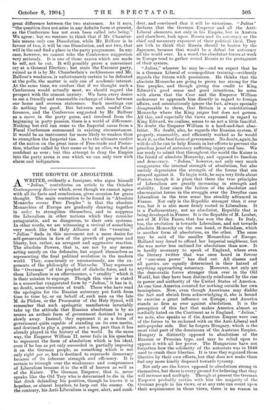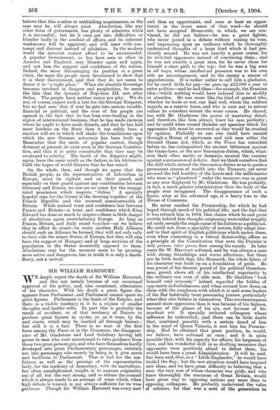A WRITER, evidently a foreigner, who signs himself "Julius," contributes an
article to the October Contemporary Review which, even though we cannot agree with all its facts and conclusions, gives occasion for grave thought. The main contention to be found in "Absolute Monarchs versus Free Peoples" is that the absolute Monarchies of Europe are gradually drawing together in order to strengthen themselves, and to a suppress the Liberalism in other nations which they consider antagonistic, and so dangerous, to their own systems. In other words, we are witnessing a revival of something very much like the Holy Alliance of the "twenties." " Julius " finds in this movement not a mere desire for self-preservation in face of the growth of progress and liberty, but, rather, an arrogant and aggressive reaction. The absolute Powers, that is, are not by any means acting merely on the defensive, but regard themselves as representing the final political evolution in the modern world. They, consciously or unconsciously, are the ex- ponents of the philosophy of Nietzsche. They represent the " Overman ', of the prophet of diabolic force, and to them Liberalism is an effervescence, a " crudity " which it is their mission to expunge. Though this view is stated in a somewhat exaggerated form by "Julius," it has in it, no doubt, some elements of truth. Those who have read the apologies for the Russian autocracy put forth from time to time by, or on behalf of, such men as the late M. de Plehve, or the Procurator of the Holy Synod, will remember that such apologetic manifestoes invariably take up the attitude that Russian absolutism is by no means an archaic form of government destined to pass slowly away. Instead, they represent it as a form of government quite capable of standing on its own merits, and destined to play a greater, not a less, part than it has already played in the history of the world. In the same way, the Emperor William II. never fails in his speeches to represent the form of absolutism which is , his ideal, even if he has as yet only succeeded in partially imposing it on the German people, as something which is not only right per se, but is destined to supersede democracy because of its inherent strength and efficiency. It is certain to triumph over the weaknesses and compromises of Liberalism because it is the will of heaven as well as of the Kaiser. The German Emperor, that is, never speaks like the Old Tory who is determined to die in the last ditch defending his position, though he knows it is hopeless, or almost hopeless, to keep out the enemy. On the contrary, his Anti-Liberalism is eager, alert, and confi- dent, and convinced that it will be victorious. " Julius ' declares that the German Emperor and all the Anti- Liberal elements, not only in his Empire, but in Austria and elsewhere, look upon Russia and its autocracy as the chief and necessary exponent of their political Mel'. They are loth to think that Russia should be beaten by the Japanese, because that would be a defeat for autocracy all the world over. In a word, the absolutist forces at work in Europe tend to gather round Russia as the protagonist of their system.
"Julius," whoever he may be—and we expect that he is a German Liberal of cosmopolitan training—evidently regards the future with pessimism. He thinks that the absolute Monarchs are going to prove too strong for the free peoples, and though giving due credit to King Edward's good sense and good intentions, he note* with alarm that the Czar and the Emperor William endeavour to approach him directly in regard to foreign affairs, and ostentatiously ignore the fact, always specially disagreeable to them, that Britain is a constitutional Monarchy where the King reigns but does not govern. All this, and especially the views expressed in regard to King Edward, we confess, seems to us not a little fanciful. No doubt the Emperor William is a hard-and-fast abso- lutist. No doubt, also, he regards the Russian system, if properly, reasonably, and efficiently worked as he would work it, as the best form of government. No doubt, again, he will do all he can to help Russia in her efforts to prevent the priceless jewel of autocracy suffering injury and loss. We are ready to admit that throughout the world the Kaiser is the friend of absolute Monarchy, and opposed to freedom and democracy. "Julius," however, not only very much exaggerates the internal strength of absolutism, but also unduly depreciates the strength of the forces that are arrayed against it. To begin with, he says very little about France, though it is plain that there the true principles of Liberalism are greatly increasing in strength and stability. Ever since the failure of the absolutist and obscurantist forces in the struggle over the Dreyfus case Liberalism in the true sense has steadily advanced in France. Not only is the Republic stronger than it ever was, but it is also more firmly rooted in Liberalism. It is a Parliamentary, not an absolutist, Republic that is being developed in France. It is the Republic of M. Loubet, not of M Faix Faure, that has won the day. In Italy, too, the evolution is towards Liberalism, and not towards absolute Monarchy on the one hand, or Socialism, which is another form of absolutism, on the other. The same may be said of the smaller Monarchies of Europe. Holland may dread to offend her Imperial neighbour, but she was never less inclined for absolutism than now. It is hardly necessary to speak of England, where even the literary twitter that was once heard in favour of "one-man power" has died out. All classes and all parties are equally determined in their hatred of anything approaching autocracy. Moreover, not only are the democratic forces stronger than ever in the Old World, but they have been distinctly reinforced by the rise in power and authority of the United States of America. At one time America counted for nothing outside her own hemisphere. Now, even though Americans may dislike the fact and shrink from acknowledging it, she is bound to exercise a great influence on Europe ; and America stands as firm as ever against absolutism. It is the perception of this fact that makes America almost as cordially hated on the Continent as is England. "Julius," we note, also speaks as if the Austrian Empire were one of the forces to be reckoned with on the Anti-Liberal and anti-popular side. But he forgets Hungary, which is the most vital part of the dominions of the Austrian Empire. Hungary is distinctly opposed to absolutism of the Russian or Prussian type, and may be relied upon to oppose it with all her power. The Hungarians have not forgotten how the solidarity of the autocrats was in 1848 used to crush their liberties. It is true they regained those liberties by their own efforts, but that does not make them feel any more kindly disposed towards tyranny.
Not only are the forces opposed to absolutism strong in themselves, but there is every ground for believing that they will increase and multiply. Though at present the German Emperor probably carries with him the majority of the German people in his views, or at any rate can count upou their acquiescence in those views, there is no reason to believe that this sombre or unthinking acquiescence, as the case may be, will always exist. Absolutism, like any other form of government, has plenty of admirers while it is successful ; but let it once get into difficulties or blunder badly in the conduct of affairs, and its inherent weaknesses will be apparent, and will meet with con- tempt and distrust instead of adulation. In the modern world the autocrat cannot afford to be unsuccessful. A popular Government, as has been seen so often in America and England, may blunder again and again, and not lose the support and confidence of the nation. Indeed, the more discouraging its position at a great crisis, the more the people seem determined to show that it is their Government, and that they do not mean to desert it in "a tight place." When the absolute Sovereign becomes involved in dangers and perplexities, he meets the fate that the dynasty of Napoleon III, met after Sedan. The people have neither mercy nor pity. We do not, of course, expect such a fate for the German Emperor, but we feel sure that if ever he gets into serious trouble, financial or political, and the eyes of his people are opened to the fact that he has been over-trading in the region of international business, that he has made enemies where he ought to have made friends, and that he has laid more burdens on the State than it can safely bear, a reaction will set in which will shake the foundations upon which the new German autocracy has been built up. Remember that the seeds of popular control, though dormant at present, do exist even in the German Constitu- tion, and that it is quite conceivable that they may be awakened to activity. The death of the Emperor might, again, have the same result as the failure in his lifetime to fulfil the hopes of world-Empire that he has raised.
On the whole, then, and though we agree that the British people, as the representatives of Liberalism in Europe, must be vigilant and on their guard, and especially on their guard against any combination between Germany and Russia, we can see no cause for the exagge- rated pessimism which inspires "Julius." A specially hopeful sign for the future is the drawing together of the French Republic and the crowned commonwealth of Britain. While mutual trust and confidence last between France and. Britain—a trust and confidence which King Edward has done so much to inspire—there is little danger of absolutism again overwhelming Europe. As long as France, Britain, and Italy stand together—as we believe they in effect do stand—to resist another Holy Alliance should such an Alliance be formed, they will not only rally to their side the minor States of Europe, but they will also have the support of Hungary and of large sections of the population in the States nominally opposed to them. Absolutism may for the moment seem to be growing more active and dangerous, but in truth it is only a death- flurry, not a revival.











































 Previous page
Previous page